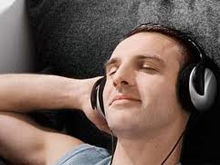Health Topics
-
Healthy Living
-
|
|
May 2010
|
| Music Therapy for Cardiac Rehab |
| Dr Thirumalachari Mythily |
| |
 |
Music therapy conditions the heart and reduces hypertension. Best results are reaped when music therapy is administered before the surgery, specifically in Coronary Artery Bypass Graft (CABG) Music Medicine has developed into an active and comprehensive discipline. An increasing number of physicians have joined with research scientists and therapists internationally, to provide for a synthesis of thought and technique of Music Medicine. The development of sensitive techniques to obtain information from functioning human brains non-invasively by brain scans also has been a factor.
|
Music affects behaviour and health through its effects on the nervous system, particularly the brain and its interactions with the rest of the body.
Validated Healing
Pain is the most common reason people seek medical help. Though medicines, imagery, deep breathing and music were being used to treat pain, these non-invasive procedures did not have any research data to support it – till now. Currently, solid data is available to support using music as a modality to relieve pain. So much so that the World Health Organisation describes music therapy as a non-intrusive intervention, which allows a patient to relax, providing distraction from the pain. Music reduces pain intensity and competes with the pain impulses in the central nervous system.
Music Before CABG
Our heart is a mechanical pump, which works relentlessly without any casual leave or earned leave. Its duty is to work continuously till its owner’s final day. If the heart is not pumping blood adequately and sending it to every part of the body, especially to the brain, we won’t be able to execute anything, however clever we are. Sometimes, rather many a times, our heart too needs some cajoling and coaxing in the form of treatment, medicine and surgery.
Music, both as a stand-alone therapeutic procedure and as an aid along with medication, can be given to patients both before and after heart surgery. Music therapy conditions the heart and reduces hypertension. Best results are reaped when music therapy is administered before the surgery, specifically in Coronary Artery Bypass Graft (CABG). It helps the patient gain adequate confidence about his surgery’s efficacy. Music as a direct experience, before being transformed into a thought process, helps the brain produce and enhance the quality of serotonin - the neurotransmitters responsible for clarity of thought and alertness. This ensures better surgery results and faster recovery.
Music After CABG
Music therapy reduces the duration of anaesthetic slumberity, bringing the rostromedial cortex in the brain to alertness. This ensures early recovery. The neurotransmitters - serotonin and dopamine - are to be qualitatively high, to be in alertness after surgery. Music helps the whole brain to come to alertness through its influence on the brain’s right hemisphere.
Regular and continuous exposure to music also enhances endorphin secretion, which helps surgery sutures heal faster.
Recently, 61-year-old Bharatiamma* underwent CABG in Chennai. But even 36 hours after the surgery, she could not sustain her consciousness for long. The surgeon thus prescribed music therapy, which helped Bharatiamma sustain her consciousness for longer periods. She was shifted to the room in the next 24 Dr. Thirumalachari Mythily is Cognitive Neuro Psychologist and Music Therapist at Apollo Hospitals, Chennai hours, and as scheduled, got discharged on the sixth day after coming from the ICCU.
Music therapy, in short, does enormous service both to the sick, and to those who want to maintain their wellness. Whatever may be your reason to enter a hospital, music as an additional therapeutic procedure or adjunct along with the required treatment pattern, will be very beneficial.
|
|
 |
Dr. Thirumalachari Mythily is Cognitive Neuro Psychologist and Music Therapist at Apollo Hospitals, Chennai |
|
|